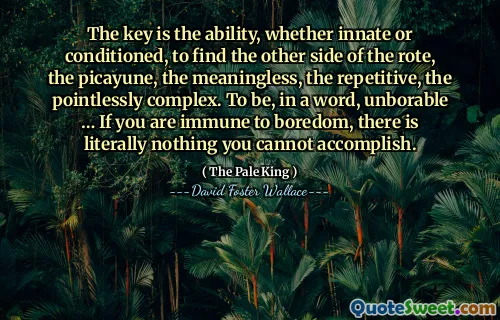David Foster Wallace was a renowned American author known for his distinctive writing style and profound insights into contemporary life. He gained acclaim for his novels, essays, and short stories, particularly for his 1996 novel "Infinite Jest," which is celebrated for its complexity and exploration of themes such as addiction, entertainment, and the search for meaning in modern society. Wallace's work often blends humor and seriousness, providing readers with a unique perspective on existential issues. In addition to his literary achievements, Wallace was also an essayist who tackled a wide range of topics, from tennis to politics to philosophy. His essays reveal his keen observations and deep intellect, often infusing personal experiences with broader societal critiques. He had a knack for making complex ideas accessible, engaging footnotes and digressions that added richness to his narratives. Tragically, Wallace's life was marked by struggles with depression, leading to his untimely death in 2008. Despite this, his legacy continues to influence writers and readers alike, as his works challenge conventional thought and encourage introspection. Wallace’s unique voice and innovative style have cemented his status as a key figure in contemporary literature, inviting ongoing discussion and analysis of his contributions.
David Foster Wallace was an influential American novelist, essayist, and short story writer, born in 1962 and known for his complex narratives and unique style.
His most famous work, "Infinite Jest," released in 1996, addresses themes like addiction and the search for meaning, demonstrating his ability to blend humor with serious topics.
Wallace's struggles with mental health ultimately led to his passing in 2008, but his literary legacy persists, inspiring readers and writers to explore profound themes through innovative storytelling.
More »
Today Birthdays
1955 -
Max Lucado
1946 -
John Piper
1842 -
William James
1907 -
Abraham Joshua Heschel
1887 -
Aldo Leopold
1755 -
Alexander Hamilton
1976 -
Alethea Kontis
1971 -
Mary J. Blige
1825 -
Bayard Taylor
1943 -
Jim Hightower
1885 -
Alice Paul
1923 -
Carroll Shelby
1928 -
David L. Wolper
1954 -
Kailash Satyarthi
1972 -
Amanda Peet
1946 -
Naomi Judd
1970 -
Malcolm D. Lee
1955 -
Christian Marclay
1973 -
Rahul Dravid
1987 -
Jamie Vardy
1942 -
Clarence Clemons
1992 -
Fatima Sana Shaikh
1948 -
Larry Harvey
1930 -
Rod Taylor

